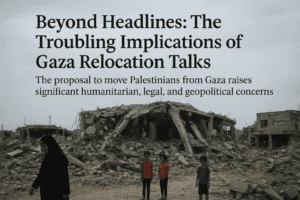Beyond Headlines: The Troubling Implications of Gaza Relocation Talks
Israel and the US are privately advancing plans, influenced by Trump’s past proposal, to relocate Palestinians from Gaza, framing it as humanitarian. This faces intense international criticism, including from Europe and Arab states, who deem it unrealistic and a potential violation of international law prohibiting forced displacement from occupied territory. Crucially, Egypt is under pressure to accept refugees in Sinai but fiercely resists, citing national security risks, sovereignty concerns, and the dangerous precedent it sets regarding Palestinian rights.
Reports describe contentious meetings, even “shouting matches,” highlighting severe regional friction. Critics argue the plan fundamentally undermines Palestinian self-determination and the two-state solution, while distracting from urgent priorities: achieving a ceasefire, delivering massive humanitarian aid, and negotiating a viable political future for Gaza within Palestine. The vision of Gaza as a depopulated “tourist destination” is widely condemned as grotesquely detached from reality.

Beyond Headlines: The Troubling Implications of Gaza Relocation Talks
The Wall Street Journal’s report confirming quiet Israeli-US efforts to relocate Palestinians from Gaza, spurred by former President Trump’s controversial suggestion, isn’t just another headline. It reveals a dangerous trajectory with profound humanitarian, legal, and geopolitical consequences that demand deeper scrutiny than simple policy debate.
More Than “Humanitarian Relocation”: A Legal and Moral Quagmire
The framing of this initiative in “humanitarian terms” by its proponents rings hollow against the stark realities on the ground and established international norms:
- The Shadow of Forced Displacement: International law, particularly the Fourth Geneva Convention, explicitly prohibits the forcible transfer or deportation of protected persons from occupied territory. Any plan involving the systematic movement of hundreds of thousands of people out of Gaza, especially without their genuine, free, and informed consent, would constitute a grave breach. Calling it “humanitarian” does not erase this fundamental legal threshold.
- Undermining Self-Determination: Gaza, despite its current devastation and occupation, remains part of the internationally recognized Palestinian territories. Mass relocation efforts inherently undermine the Palestinian right to self-determination and the long-standing international consensus supporting a two-state solution based on the 1967 lines. This looks less like crisis management and more like potential demographic engineering.
- The Absurdity of the “Tourist Destination” Vision: The reported origin of this push – Trump’s idea of the US “taking over” Gaza, displacing its population, and redeveloping it as a luxury enclave – is not merely unrealistic; it’s grotesquely detached from the lived reality of Palestinians. It transforms a humanitarian catastrophe and a people’s ancestral home into a real estate venture, ignoring decades of conflict, trauma, and legitimate national aspirations. The jarring disconnect between this vision and the images of mourning and destruction emerging daily from Gaza is staggering.
Geopolitical Tinderbox: Straining Regional Stability
The report of pressure on Egypt to accept Gazans into the Sinai Peninsula highlights the explosive regional implications:
- Egypt’s Fierce Resistance is Rooted in History and Strategy: Egypt’s vehement rejection isn’t just bureaucratic stubbornness. It stems from deep-seated fears:
- National Security: Sinai is already a sensitive security zone. Settling a large, potentially destabilized population there is seen as an immense risk.
- Sovereignty: It would violate Egypt’s firm stance against actions that might permanently sever Gaza from the Palestinian cause or compromise Egyptian sovereignty.
- The “Right of Return” Precedent: Accepting Gazans en masse could be misconstrued as endorsing a permanent resettlement, undermining the Palestinian right of return – a core issue for all Arab states.
- “Shouting Matches” Signal Deepening Rifts: The reported contentious meetings and “shouting matches” between Israeli and Egyptian officials underscore how toxic and divisive this proposal is. It actively damages vital regional relationships at a time when stability is already fragile.
- Uniting Critics, Isolating Proponents: The swift condemnation from European and Arab governments, labeling the plans both unrealistic and potentially illegal, isolates Israel and the US on this specific issue. It risks further eroding international support and fuels existing narratives about disregard for Palestinian rights.
The True “Humanitarian” Imperative
Amidst discussions of relocation, the most urgent humanitarian imperatives are being overshadowed:
- Immediate Ceasefire and Aid: The paramount need remains an end to hostilities enabling unfettered humanitarian access to prevent famine and disease.
- Post-War Governance and Reconstruction: Meaningful planning must focus on Gaza’s future within Palestine, involving legitimate Palestinian representatives. Who governs? How is reconstruction funded and managed without creating dependency or exploitation? How are rights and security guaranteed?
- Addressing Root Causes: Sustainable peace requires confronting the core issues: occupation, blockade, lack of Palestinian self-determination, and mutual security guarantees. Relocation schemes are a distraction from these essential, albeit difficult, negotiations.
Conclusion: A Dangerous Distraction with Lasting Repercussions
The quiet talks on relocating Gaza’s population are not a viable solution; they represent a dangerous escalation of rhetoric into potential policy. They flirt with violations of international law, threaten regional stability by alienating key partners like Egypt, and fundamentally undermine the foundations of any just and lasting peace based on Palestinian rights. Framing the displacement of a traumatized population as “humanitarian” while simultaneously promoting visions of beach resorts on their ruins is not just cynical; it’s a profound moral failure.
The focus must urgently shift away from coercive demographic schemes and towards immediate life-saving aid, a sustainable ceasefire, and a credible political process that addresses the legitimate aspirations and rights of both Palestinians and Israelis. The alternative path outlined in these reported talks leads only to deeper suffering and renewed conflict.
You must be logged in to post a comment.